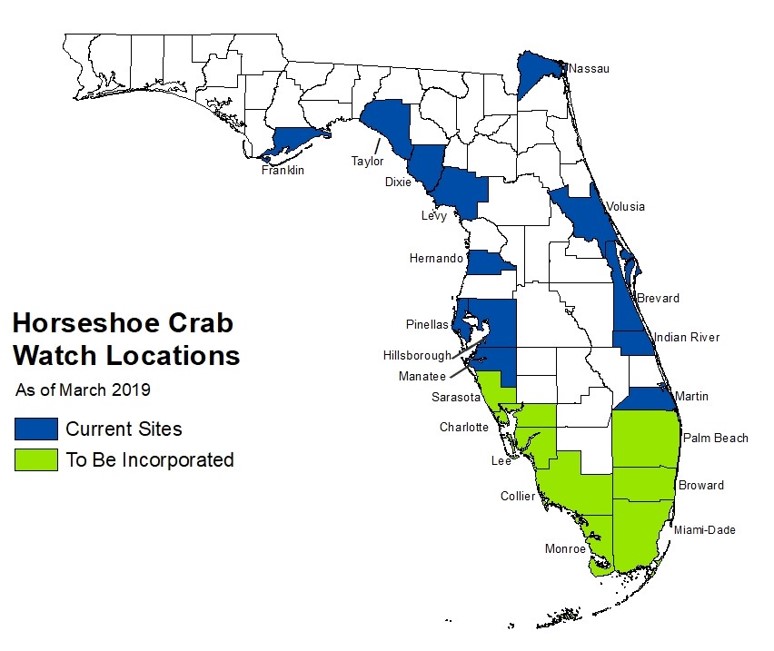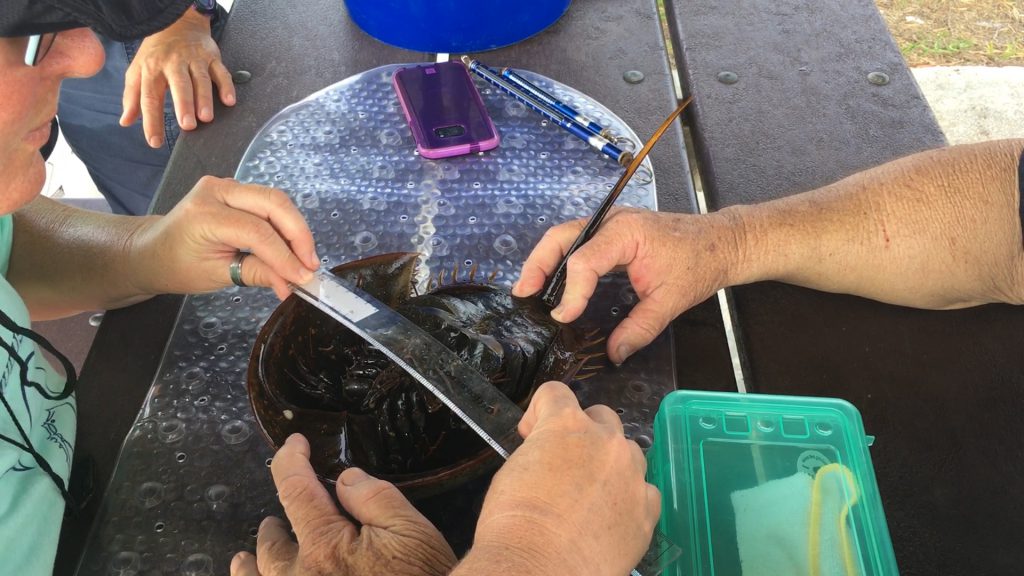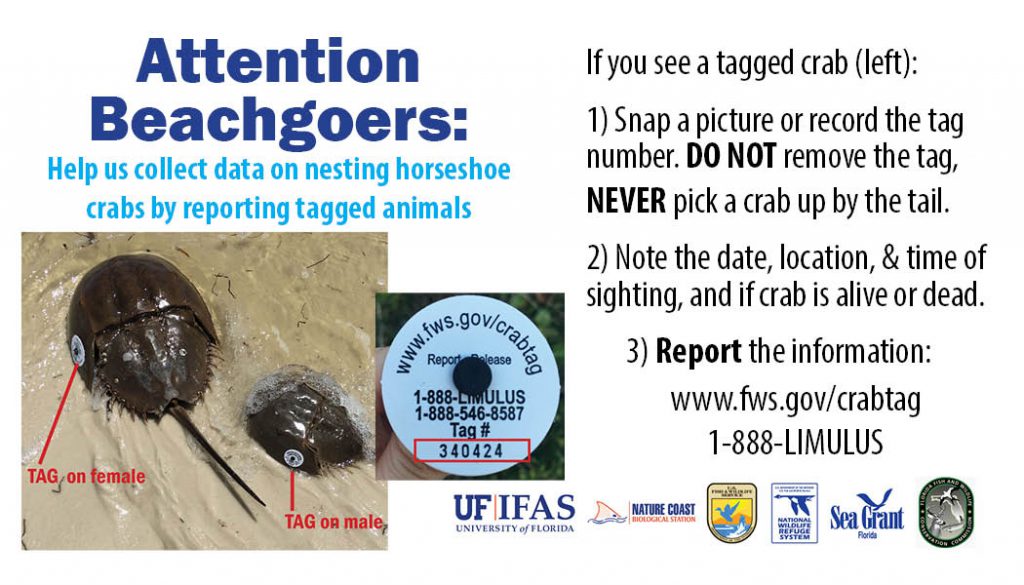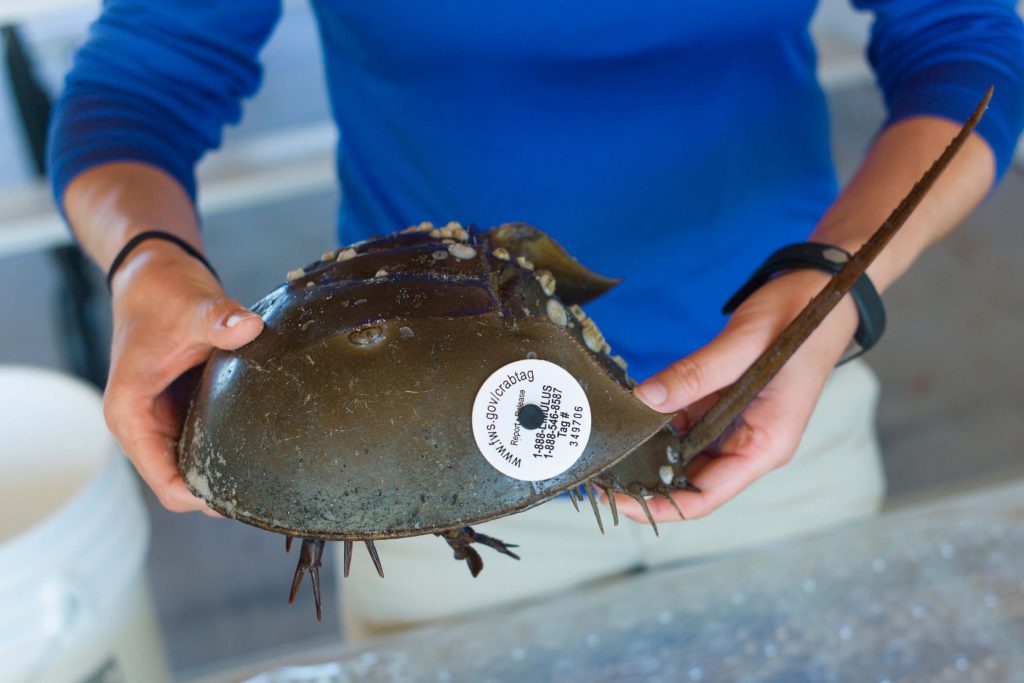
An ever-expanding volunteer base
Florida Horseshoe Crab Watch (FHCW) is a citizen science program established along Florida’s coast in 2015. The spring 2019 sampling season (Mar-Apr 2019) was the 7th round of horseshoe crab nesting surveys and tagging by citizen scientists on Cedar Key beaches. The rapid growth of the program is exciting! New programs have started all over the state in 2018-2019 as more and more volunteer coordinators join the team. 
The number of volunteers is growing, too, up from 20 active volunteers in Fall 2016 to more than 106 active citizen volunteers in 2019 for Cedar Key alone. This wonderful, dedicated volunteer corps donated over 1,311 hours and traveled a total of 25,844 miles to complete the Nature Coast area surveys in fall 2018-spring 2019! In the last two seasons alone, our citizen scientists went above and beyond their basic data collection duties. Our volunteers educated at least 643 people in the Nature Coast about horseshoe crabs. Most of these educational opportunities arise when volunteers are walking the beach on their surveys and are approached by curious beachgoers. A few volunteers even wrote articles for their local newspapers!
FWC hires new HSC program lead
The Florida Fish and Wildlife Conservation Commission is one of the leaders of the Florida Horseshoe Crab Watch program. With the growing demand for training workshops and data coordination, FWC has invested in a full-time staff member to coordinate the statewide activities. The new staff member, Berlynna Heres, has been instrumental in helping with the major ramp-up of the statewide Florida Horseshoe Crab Watch program. Make sure to welcome her to the team next time you see her!
Citizen scientists collect high quality data
 In spring 2019, volunteers completed a total of 96 surveys in Cedar Key and Shired Island. Our volunteers collected information on more than 6,750 horseshoe crabs and tagged ~1,160 crabs this spring. The Florida Fish and Wildlife Conservation Commission is dedicated to collecting data on horseshoe crab nesting, but does not have anywhere near enough staff to achieve the high level of data collection the volunteers are able to complete. A major accomplishment of FHCW in 2019 was the presentation of data collected by citizen scientists to an international horseshoe crab conservation workshop in China. This is a major nod to the quality data collected by our hardworking volunteers!
In spring 2019, volunteers completed a total of 96 surveys in Cedar Key and Shired Island. Our volunteers collected information on more than 6,750 horseshoe crabs and tagged ~1,160 crabs this spring. The Florida Fish and Wildlife Conservation Commission is dedicated to collecting data on horseshoe crab nesting, but does not have anywhere near enough staff to achieve the high level of data collection the volunteers are able to complete. A major accomplishment of FHCW in 2019 was the presentation of data collected by citizen scientists to an international horseshoe crab conservation workshop in China. This is a major nod to the quality data collected by our hardworking volunteers!
How can you help?
If you see a tagged horseshoe crab, alive or dead, you can really help our data collection efforts by reporting the tagged animal. To report a tag, follow the instructions below. You can download the picture to your phone so you will always have the information.

Stay tuned for more!
Florida Horseshoe Crab Watch will continue in Fall 2019, and may be coming to a beach near you! Visit https://ncbs.ifas.ufl.edu/extension/florida-horseshoe-crab-watch/ or email savanna.barry @ ufl.edu for more information about how to get involved in Florida Horseshoe Crab Watch. You can sign up for the next training workshop in Cedar Key (coming up on Sept 13th, 2019) using this link: https://www.eventbrite.com/e/florida-horseshoe-crab-watch-training-workshop-fall-2019-tickets-66391596051.

 0
0
